#friedrich holderlin
Text

Un beau matin (2022) by Mia Hansen-Løve
Book title
Brief an den Vater (1952) by Franz Kafka
Radetzkymarsch (1932) by Joseph Roth
Der Mann ohne Eigenschaften (1930) by Robert Musil
Hyperion oder der Eremit in Griechenland (1797) by Friedrich Hölderlin
Reigen (1903) / Liebelei (1895) by Arthur Schnitzler
Immanuel Kant (1978) by Thomas Bernhard
Stücke 2 (1998) by Thomas Bernhard
Korrektur (1975) by Thomas Bernhard
Der Kulturer (1962) by Thomas Bernhard
Gedichte by Friedrich Hölderlin
Leben und Werk by Johann Wolfgang von Goethe
#austrian literature#german poetry#german literature#leben und werk#johann wolfgang von goethe#gedichte#friedrich holderlin#der kulturer#thomas bernhard#korrektur#stucke 2#immanuel kant#reigen liebelei#arthur schnitzler#Hyperion oder der Eremit in Griechenland#Der Mann ohne Eigenschaften#robert musil#Radetzkymarsch#joseph roth#Brief an den Vater#franz kafka#books in movies#un beau matin#mia hansen løve
35 notes
·
View notes
Text
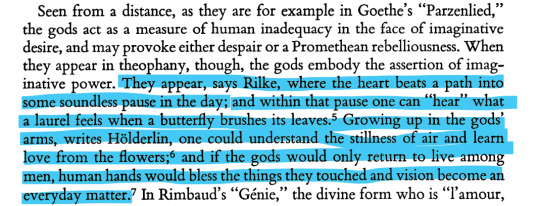
Kramer, Lawrence, ‘The Return of the Gods: Keats to Rilke’, Studies in Romanticism, 17.4 (1978), 483–500 <https://doi.org/10.2307/25600154>
41 notes
·
View notes
Text
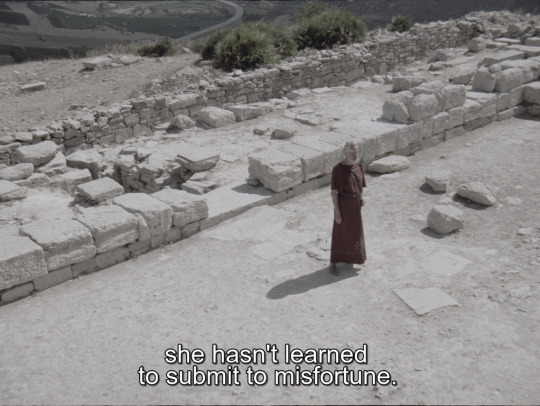


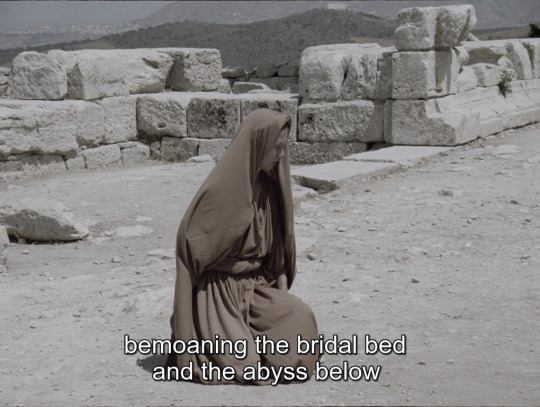
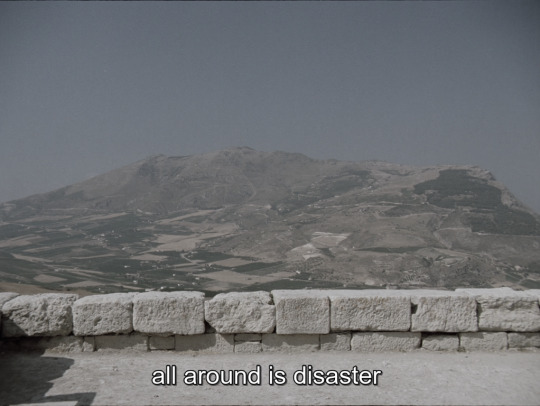
Antigone, Danièle Huillet / Jean-Marie Straub (1992)
60 notes
·
View notes
Text


Martin Heidegger, Hölderlin’s Hymns “Germania” and “The Rhine”
17 notes
·
View notes
Text


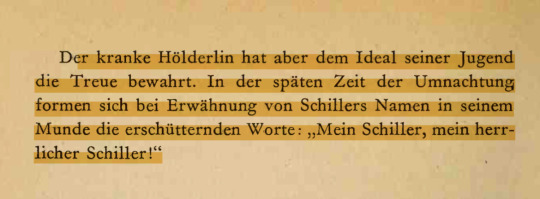
Random Schiller x Hölderlin moments that destroyed me
(Siómón Solomon, Hölderlin’s Poltergeist/Peter Weiss, Hölderlin/H.H. Borcherdt, Schiller und die Romantiker)
9 notes
·
View notes
Photo

Patmos
for the Landgrave of Homburg
God is near
Yet hard to seize.
Where there is danger,
The rescue grows as well.
Eagles live in the darkness,
And the sons of the Alps
Go fearlessly over the abyss
Upon bridges simply built.
Therefore, since the peaks
Of Time are heaped all about,
And dear ones live close by,
Worn down on the most separated mountains —
Then give us innocent waters;
Give us wings, and the truest minds
To voyage over and then again to return.
Thus I spoke, when faster
Than I could imagine a spirit
In the twilight
Seduced me out of my own home
To a place I never thought I’d visit.
The shaded forests and longing
Streams of my homeland.
I couldn’t recognize the lands,
but then suddenly
In fresh a glow, mysterious
In the golden haze, quickly emerging
In the steps of the sun,
With the fragrance of a thousand peaks,
Asia rose before me, and dazzled
I searched for something
Familiar, since the broad alleyways
Were unknown to me: where the gold-ornamented
Patoklos comes rushing down from Tmolus,
Where Taurus is to be found, and Messogis,
And the gardens are full of flowers,
Like a quiet fire. Up above
In the light the silver snow
Blooms, and ivy grows from ancient
Times on the inapproachable walls,
Like a witness to immortal life,
While the joyous, the god-built palaces
Are borne by living columns
Of cypress, cedar and laurel.
But around Asia’s gates
Swish pulling here and there
At an uncertain sea level
With enough unshaded straits,
Though the sailor knows these islands.
And when I heard,
that one of these close by
Was Patmos, I wanted very much
To put in there, to enter
The dark grotto. For unlike
Cyprus, rich with springs,
Or any of the others, Patmos
Is housed on earth poorly,
But nevertheless is hospitable
And if a stranger should come to her,
Sent by shipwrecked or longing for
His home or for a departed friend,
She’ll gladly listen, and her
Offspring as well, the voices
In the hot grove, so that where sands blow
and heat cracks the tops of the fields,
They hear him, these voices,
And lovingly sound the man’s grief.
Thus she once looked after
The seer who was loved by god,
Who in his holy youth
Had walked together inseparably
With the Son of the Highest,
Because the Bringer-of-Storms loved
The simplicity of this disciple.
Thus did that attentive man observe
The countenance of the god precisely,
There at the mystery of the grapevine,
Where they sat together at the hour
Of the Last Supper, when the Lord with
His great spirit quietly envisioning His
Own death, and forespoke it and also
His final act of love, for He always
Had words of kindness to speak,
Even then in His prescience,
To soften the violence and wildness of the world.
For all is good. Then He died. Much
Could be said about it. At the end
His friends recognized how filled with joy
He appeared, how victorious.
And yet the men grieved, now that evening
Had come, and were taken by surprise,
Since they were full of great intentions,
And loved living under the sun,
And didn’t want to leave the countenance
Of the Lord, and of their home.
It penetrated them like fire into iron,
And the One they love walked beside them
Like a shadow. Therefore He sent
The Spirit upon them, and the house
Shook and God’s house and weather rolled
Over their heads, filled with anticipation, while
They were gathered with heavy hearts,
Like heroes whose death approached,
Then once more He appeared to them
At his departure. For now
The royal day of the sun
Was extinguished, as he cast
The shining scepter from himself,
With godlike suffering, but knowing
He would come again at the right time.
It would have been wrong
To cut off disloyally His work
The work of humankind, since now it brought Him joy
To live on in loving night, to preserve
Before simple eyes, unrelated
The depths of wisdom. Deep in the
Mountains grew also living images,
Yet it is terrible how God here and there
Scatters the living, and how very far they are flung.
And how fearsome it was to leave
The sight of dear friends and walk off
Alone far over the mountains, where
The Holy Spirit was twice
Recognized, in unity.
It hadn’t been prophesied to them:
Rather it seized them right by the hair
Just at the moment when the God
Who had turned from them, looked back, and they called out to Him
To stop, and they reached their hands to
One another as if bound by a golden cord,
And called it evil —
But when He dies —He about whom beauty hangs
Loved most of all, so that a miracle
Surrounded him, and he was the
Elect of the heavens —
And when those who lived together
Thereafter in His memory, became
Perplexed and no longer understood
One another; and when floods carry off
The sand and willows and temples,
And when the fame of the demi-god
And His disciples is blown away
And even the Highest turns aside his
Countenance, so that nothing
Immortal can be seen either
In heaven or upon the green earth —
What meaning must we take from all of this?
It is the cast of the sower, as he seizes
Wheat with his shovel
Throwing it into the clear air,
Swinging it across the threshing floor.
The chaff falls to his feet, but
The grain emerges in the end.
It’s not bad if some of it gets lost,
Or if the sounds of His living speech
Fade away. For the divine work
resembles our own:
The Highest doesn’t want all to be
Accomplished at once.
As mines yield iron,
And Ætna its glowing haze,
Then I’d have wealth sufficient
To form a picture of Him and see
What he was, the Christ.
But if somebody spurred himself on
Along the road and, speaking sadly,
Fell upon me and surprised me, so that
Like a servant I’d make an image of the God —
Once I saw the lords
Of heaven visibly angered, not
That I wanted to become something different,
But that I wanted to learn something more.
The lords are kind, but while they reign
They hate falsehood most, when humans become
Inhuman. For not they, but undying Fate
It is that rules, and their work
Transforms itself and quickly reaches an end.
When the heavenly triumph proceeds higher.
Then the joyful Son of the Highest
Is called like the sun by the strong,
As a watchword, like the staff of a song
That points downwards,
For nothing is ordinary. It awakens
The dead, those raised incorruptible.
And many are waiting whose eyes are
Still too shy to see the light directly.
They wouldn’t do well in the sharp
Ray: a golden bridle
Holds back their courage.
But when quiet radiance falls
From the Holy Scripture, with
The world forgotten and their eyes
Swollen, then they may enjoy that grace,
And study the quiet image.
And if the heavens love me,
As I now believe,
Then how much more
Do they love you.
For I know one thing:
That the will of the eternal Father
Concerns you greatly.
Under a thundering sky
His sign is silent.
And there is One who stands
Beneath it all his life.
For Christ still lives.
But the heroes, all his sons
Have come, and the Holy Scriptures
Concerning Him and the lightening,
Explain the deeds of the Earth up to this day,
Like a footrace that knows no end.
And He is with us too, for his works and all
Known to Him from the very beginning.
For far too long
The honor of the heavens
Has gone unseen.
They practically have to
Guide our fingers as we write,
And with embarrassment the power
Is ripped from our hearts.
For every heavenly being
Expects a sacrifice,
And when this is neglected,
Nothing good can come of it.
Without awareness we’ve served at the feet of
Our Mother Earth, and the Light
Of the Sun as well, but what our Father
Who reigns over everything wants most
Is that the established Word be
Caringly attended, and that
Which endures be construed well.
German song must accord with this.
—Friedrich Hölderlin, Patmos (1803) in: Sämtliche Werke und Briefe, vol. 1, p. 379-385 (Hanser ed. 1970)(SH Trans), first published in Harper's Magazine, July 2007
[Scott Horton]
19 notes
·
View notes
Text
"They come and go and it wastes my heart away."
Friedrich Holderlin
21 notes
·
View notes
Text
Il « habite » la folie. Il faudrait faire retour à l’étymologie du mot « folie » en allemand (« Wahnsinn ») et à « Wahn », l’illusion. À l’origine se trouve une racine, « ven », qui veut dire « aimer » et qu’il faudrait reconnaître dans des termes comme « Wonne », « délice », mais aussi « Gewohnheit », « habitude », « habitus », et « wohnen », « habiter » ; le lecteur familier d’Approche de Hölderlin aura reconnu les éléments du vers que commente Heidegger : « C’est poétiquement que l’homme habite sur cette terre » – en allemand « dichterisch wohnet der Mensch ».
27 notes
·
View notes
Text
"He who has thought most deeply loves what is most alive".
- Friedrich Hölderlin
32 notes
·
View notes
Photo
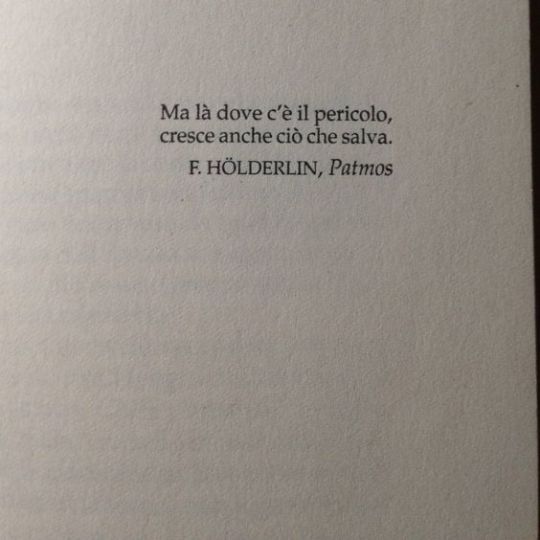
33 notes
·
View notes
Text
Friedrich Hölderlin, "Mnemosyne (second version)", translated by David Constantine.
"We are a sign with no interpretation
Painless we are and abroad
Have almost lost our language.
For when over mankind
There is quarrelling in heaven and the moons
Go violently, the sea
Speaks too and rivers
Must seek themselves a way. But One
There is without a doubt. He
Can change it any day. He hardly needs
Law. And the leaves resound, the oaks move in the wind
Then beside the snows. For the gods in the heavens
Cannot do everything. Mortals indeed
Reach sooner to the abyss. So the echo turns
With them. Time
Is long but what is true
Will happen.
But the things we love? We see
Sunshine on the ground and dry dust
And deep with shadows the woods and the smoke
Flowers from the roofs about the old crowns
Of towers, peaceably; and lost in the air
The larks trill and under the daylight
Shepherded forth the sheep of heaven graze.
And snow like lilies of the valley
Denoting nobleness
Wherever it be is shining with
The Alps' green meadows
Half and half where
Speaking of the cross set for the dead
Along the way a traveller went
The steep road and
The other with him, but what is this?
At the fig tree my
Achilles died
And Ajax lies
By the caves near the sea
By streams that neighbour Scamander.
The spirit bold in him in a roaring of the winds, after
His native Salamis' sweet
Custom, great
Ajax died abroad
Patroclus however in the king's armour. And others died,
Many besides. By their own hands
Sad, many, wild in the soul, but forced to
By gods in the end, but the others
Standing in their fate, in the field. For he riles the gods
Who will not compose himself
And spare his soul, although he must. And grief
Likewise goes wrong."
6 notes
·
View notes
Text
King Oedipus has, perhaps, an eye too many. These sufferings of this man, they seem indescribable, unspeakable, inexpressible. Which comes when drama represents such things.... The sufferings of Oedipus seem like a poor man lamenting what he lacks. Son of Laios, poor stranger in Greece! Life is death, and death is also a life.
Friedrich Hölderlin, Hymns and Fragments (1984, 252)
#friedrich holderlin#on the phenomenology of negative dialectics#quotes#words#pathei mathos#reiner schürmann#on the tragic structure of subject formation
1 note
·
View note
Text
Hiperión | Friedrich Hölderlin
«Pero en el país de los bienaventurados, quien habita es el silencio, y más arriba de las estrellas, olvida el corazón su indigencia y su lenguaje».
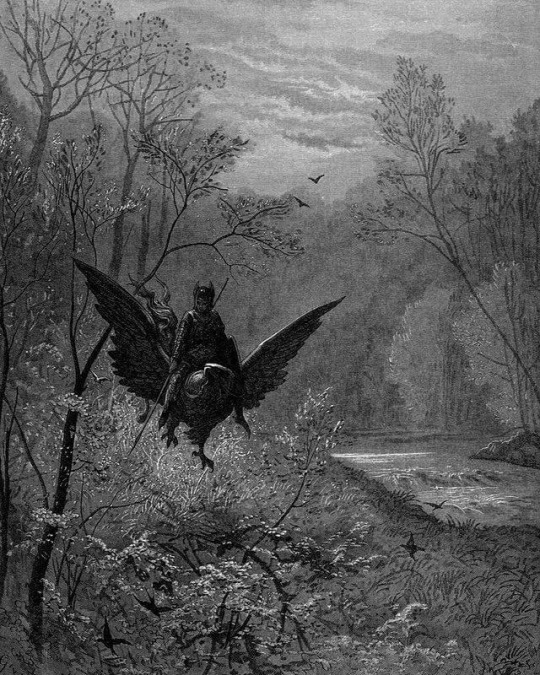
2 notes
·
View notes
Text
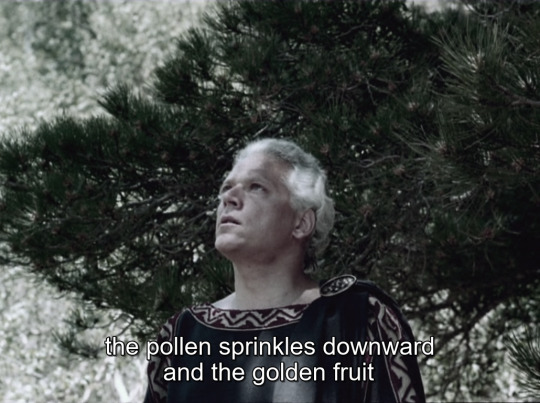
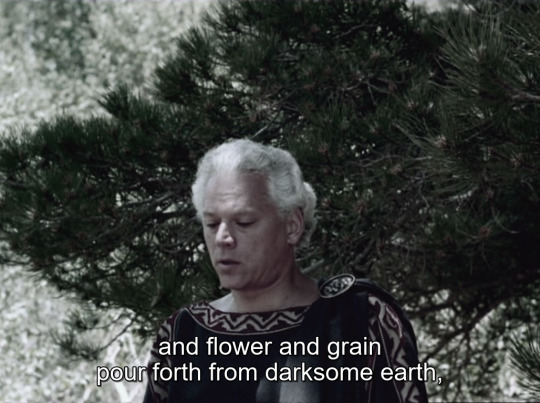
The Death of Empedocles, Danièle Huillet / Jean-Marie Straub (1987)
51 notes
·
View notes
Text
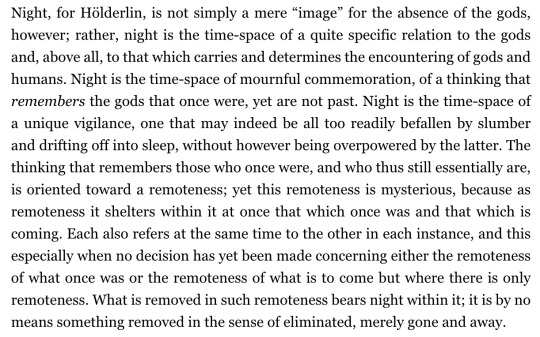
Martin Heidegger, Hölderlin’s Hymn “Remembrance”
16 notes
·
View notes
Text
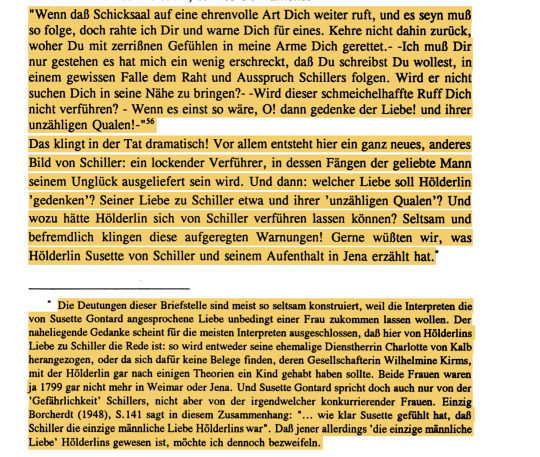
Introducing: Schiller, the Don Giovanni Unrepentant
#look at the exclamation marks#I feel you author I feel you#with all due respect#Kirms sounds like some random character invented just to preserve the heteronormative narrative#friedrich schiller#friedrich holderlin
3 notes
·
View notes